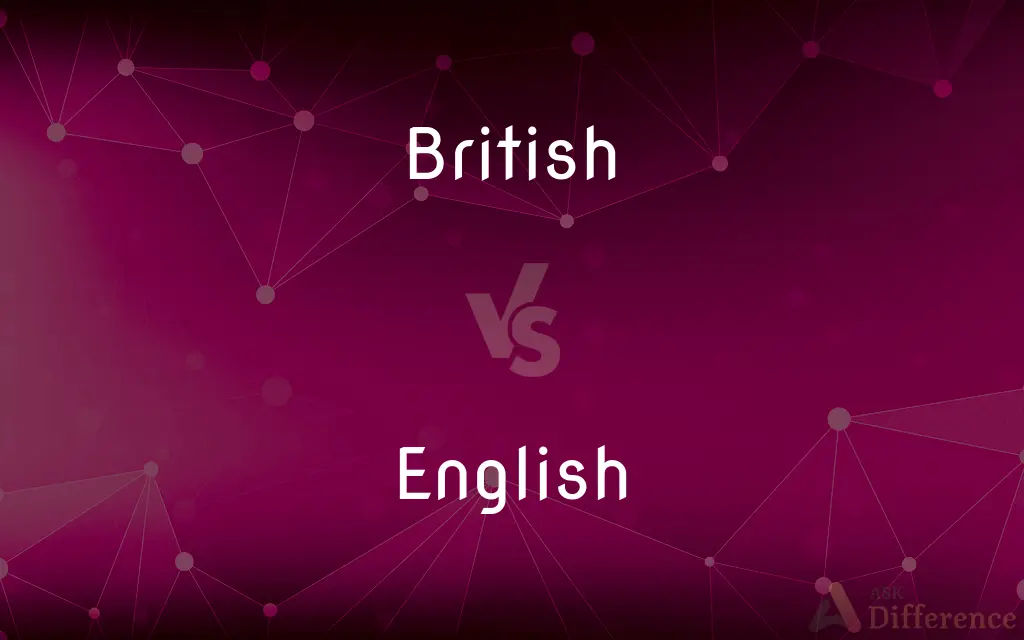British vs. English — What's the Difference?
By Maham Liaqat & Urooj Arif — Updated on March 30, 2024
British refers to anything related to the United Kingdom, while English pertains specifically to England or its language and culture.

Difference Between British and English
Table of Contents
ADVERTISEMENT
Key Differences
British is a term that encompasses the identities, cultures, and nationalities within the United Kingdom, including England, Scotland, Wales, and Northern Ireland. It relates to the collective aspects of these regions, from political structures to shared historical events. On the other hand, English specifically refers to elements associated with England, one of the UK's four countries. This includes the English language, which is spoken worldwide, and English culture, which has its own unique characteristics distinct from the broader British context.
When discussing citizenship or national identity, someone who is British may come from any of the countries within the United Kingdom. In contrast, someone who identifies as English is specifically from England. The distinction is significant in discussions about nationality, as the terms convey different senses of belonging and identity. While British identity encompasses a wider, more inclusive range of cultural and national backgrounds, English identity is specific to the traditions, history, and people of England.
In the context of language, British English encompasses the dialects and linguistic conventions found across the United Kingdom, including variations in spelling, grammar, and vocabulary. English, when used in this context, often refers specifically to the standard dialects and linguistic practices within England itself. However, English is also a global language, and when referred to in an international context, it transcends the geographical and cultural boundaries of England.
Culturally, British culture includes influences from and contributions of all the nations within the UK, blending diverse traditions, cuisines, and artistic expressions. English culture, while a significant part of British culture, focuses on traditions, literature, and customs that originated in or are closely associated with England. For example, the celebration of Shakespeare as a cornerstone of English literature, while he is also celebrated in the broader context of British culture.
The distinction between British and English is not just about semantics but reflects deeper historical, political, and cultural complexities within the United Kingdom. While the terms are sometimes used interchangeably, especially outside the UK, understanding their specific meanings is crucial for appreciating the rich diversity and individual identities that make up the British Isles.
ADVERTISEMENT
Comparison Chart
Geographical Scope
United Kingdom (England, Scotland, Wales, Northern Ireland)
England
National Identity
Includes citizens of any UK country
Pertains to individuals from England
Language
British English (includes variations across the UK)
English language, particularly the dialects within England
Culture
Encompasses cultural contributions of all UK nations
Specific to England's traditions, literature, and customs
Citizenship
British citizenship
No separate English citizenship; falls under British
Compare with Definitions
British
Language Variations.
British English includes a variety of accents and dialects from across the UK.
English
National Identity.
English identity is closely tied to the history and traditions of England.
British
Citizenship.
British citizenship grants access to rights and privileges across the UK.
English
Language.
The English language, originating in England, is now a global lingua franca.
British
Cultural Diversity.
British culture reflects the rich heritage of England, Scotland, Wales, and Northern Ireland.
English
Historical Significance.
England's history, from the Anglo-Saxon era to the industrial revolution, shapes much of its cultural identity.
British
Political Entity.
British politics involves the governance of the United Kingdom as a whole.
English
Cuisine.
Traditional English cuisine includes dishes like fish and chips and the full English breakfast.
British
International Influence.
The British Empire's history has left a lasting impact on global culture and language.
English
Cultural Contributions.
English literature, from Shakespeare to contemporary authors, plays a pivotal role in world literature.
British
Of or relating to Great Britain or its people, language, or culture.
English
Relating to England or its people or language.
British
Of or relating to the United Kingdom or the Commonwealth of Nations.
English
The language of England, widely used in many varieties throughout the world.
British
Of or relating to the ancient Britons.
English
The people of England.
British
(used with a pl. verb) The people of Great Britain.
English
Spin or side given to a ball, especially in pool or billiards
Put more English on the ball
British
British English.
English
Of, relating to, or characteristic of England or its people or culture.
British
The Celtic language of the ancient Britons.
English
Of or relating to the English language.
British
Of or pertaining to Great Britain or to its inhabitants; - sometimes restricted to the original inhabitants.
English
(used with a pl. verb) The people of England.
British
People of Great Britain.
English
The West Germanic language of England, the United States, and other countries that are or have been under English influence or control.
British
The people of Great Britain
English
The English language of a particular time, region, person, or group of persons
American English.
British
Of or relating to or characteristic of Great Britain or its people or culture;
His wife is British
English
A translation into or an equivalent in the English language.
English
A course or individual class in the study of English language, literature, or composition.
English
The spin given to a propelled ball by striking it on one side or releasing it with a sharp twist.
English
Bodily movement in an effort to influence the movement of a propelled object; body English.
English
To translate into English.
English
To adapt into English; Anglicize.
English
Spinning or rotary motion given to a ball around the vertical axis, as in billiards or bowling.
You can't hit it directly, but maybe if you give it some english.
English
An unusual or unexpected interpretation of a text or idea, a spin, a nuance.
English
Of or pertaining to England, or to its inhabitants, or to the present so-called Anglo-Saxon race.
English
Collectively, the people of England; English people or persons.
English
The language of England or of the English nation, and of their descendants in America, India, and other countries.
English
A kind of printing type, in size between Pica and Great Primer. See Type.
English
A twist or spinning motion given to a ball in striking it that influences the direction it will take after touching a cushion or another ball.
English
To translate into the English language; to Anglicize; hence, to interpret; to explain.
Those gracious acts . . . may be Englished more properly, acts of fear and dissimulation.
Caxton does not care to alter the French forms and words in the book which he was Englishing.
English
To strike (the cue ball) in such a manner as to give it in addition to its forward motion a spinning motion, that influences its direction after impact on another ball or the cushion.
English
An Indo-European language belonging to the West Germanic branch; the official language of Britain and the United States and most of the Commonwealth countries
English
The people of England
English
The discipline that studies the English language and literature
English
(sports) the spin given to a ball by striking it on one side or releasing it with a sharp twist
English
Of or relating to or characteristic of England or its culture;
English history
The English landed aristocracy
English literature
Common Curiosities
How do British and English identities differ?
British identity encompasses the collective cultures of the UK, while English identity is specific to England.
Can someone from Scotland be English?
No, someone from Scotland is Scottish, not English, but they are British.
What is unique about English culture?
English culture includes specific traditions, literature, and historical experiences unique to England.
How does the world view British and English distinctions?
Internationally, the distinctions may be less recognized, but within the UK, they are significant and meaningful.
Do British and English refer to different languages?
No, the English language refers to the same language but can include variations in dialect across the UK.
Is "British" the same as "English"?
No, "British" refers to anything related to the United Kingdom, while "English" is specific to England and its culture.
What is British English?
British English refers to the dialects and linguistic conventions across the United Kingdom.
What role does England play within the United Kingdom?
England, as the largest country in the UK, plays a significant role in its economy, politics, and culture.
Are British and English citizenship the same?
The UK offers British citizenship, not separate English citizenship. English individuals are British citizens.
Are cultural practices in England and Scotland the same?
No, England and Scotland have distinct cultural practices, reflecting their unique histories and traditions.
How do education systems differ between England and the rest of the UK?
Education systems in England, Scotland, Wales, and Northern Ireland have different curricula, qualifications, and governing bodies.
Can someone be British but not English?
Yes, individuals from Scotland, Wales, and Northern Ireland are British but not English.
How are British and English sports teams represented internationally?
In many sports, England, Scotland, Wales, and Northern Ireland compete separately, reflecting their distinct national identities within the broader UK.
What does English literature contribute to global culture?
English literature offers a rich legacy of works that have influenced global thought, language, and art.
Is the English flag the same as the British flag?
No, the English flag is the St. George's Cross, while the British flag is the Union Jack, representing the union of England, Scotland, and Northern Ireland.
Share Your Discovery

Previous Comparison
Catch vs. Hunt
Next Comparison
Toluene vs. BenzeneAuthor Spotlight
Written by
Maham LiaqatCo-written by
Urooj ArifUrooj is a skilled content writer at Ask Difference, known for her exceptional ability to simplify complex topics into engaging and informative content. With a passion for research and a flair for clear, concise writing, she consistently delivers articles that resonate with our diverse audience.
















































